The Mahbub ul Haq Research Centre (MHRC) supports interdisciplinary research, scholarship, and teaching on issues of human development, social exclusion, and inequality across South Asia.
Organisational Structure
The Centre is headed by Dr. Farah Said, Executive Director, MHRC, and Dr. Soufia Siddiqui, Director, Research.
The Centre is structured around eight thematic research clusters. Fellows from each cluster provide research leadership in their themes of interest. The clusters offer research fellows the opportunity to work in peer groups and draw on expertise across disciplines. The clusters include Political Economy and Governance, Education, Energy, Environment and Public Health, Cities, Firms, Inequality, Poverty and Social Inclusion, Technology in Society, and Public Finance.
Gender, labour, and historical foundations are considered cross-cutting themes.
MHRC has 132 Research Fellows working together on various projects and publications, including 55 external fellows and 77 resident fellows. Our external fellows are based at universities such as Harvard, Yale, Stanford, Columbia, Brown, Sussex, and Georgetown, as well as policy think tanks such as the Overseas Development Institute and the Austrian Institute for Economic Research.
Publications
Pakistan Dialogues
- Jhagra, T. K. (2023, August 17). Fixing Pension and Public Pay
- Ali, S. M., & Haroon, S. (2023, September 18). Oral History, Collaboration and Research on Women Public Sector Workers in Pakistan
- Qureshi, E. S., & Arif, R. (2023, October 31). De-Dollarization in Pakistan: A Promising Path or Distant Dream?
- Naseemullah, A., & Chhibber, P. (2024, February 19). The Moral Meaning of Pakistan’s 2024 General Elections.
- Jhagra, T. K. (2024, March 20). Universal Healthcare, with a Pakistani Twist | Reform That Works
Selected Journal Articles by Fellows
- Bonan, J., d'Adda, G., Mahmud, M. and Said, F. (2023). Nudging Payment Behaviour: Evidence from a field experiment on pay-as-you-go off-grid electricity, World Bank Economic Review, 37 (4).
- Asad, S. A., Banerjee, R., & Bhattacharya, J. (2023). Do workers discriminate against their out-group employers? Evidence from an online platform economy, Journal of Economic Behaviour and Organization, 216, 221-242.
- Hasnain, S. A., Khan, M. Y., Rezaee, A. (2023). No bulls: Experimental evidence on the impact of veterinarian ratings in Pakistan. Journal of Development Economics 161, 102999.
Other Publications by Fellows
- Cheema, A. (2023). Essay on Pakistan. 2024 Atlas: Freedom and prosperity around the world. Atlantic Council, 238-247.
- Cheema, A., Khan S., Liaqat, A. & Mohmand, S. K. (2023). Increasing Women Voters’ Turnout in Pakistan. VoxDev.
- Cai, J., Meki, M., Quinn, S., Field, E., Kinnan, C., Morduch, J., de Quidt, J, and Said, F. (2023) Microfinance, VoxDevLit, 3(2).
Books Published by Fellows
Usman, A. U. (2023). Qaum Mulk Saltanat: Citizenship and National Belonging in Pakistan.
Events
Revenue Boundaries Dashboard: Urban Unit
MHRC, in collaboration with the International Growth Centre (IGC), organised a presentation by Dr. Omar Masud (Urban Unit). He showcased a rich database on the Digital Mouza/Mussavies Boundaries in Punjab. The Mouza boundary serves as an indispensable digital marker for management, administration, and planning. The Urban Unit has data on over 600,000 mussavies, which they wanted to share with researchers and policymakers, offering open access for policy-focused research.
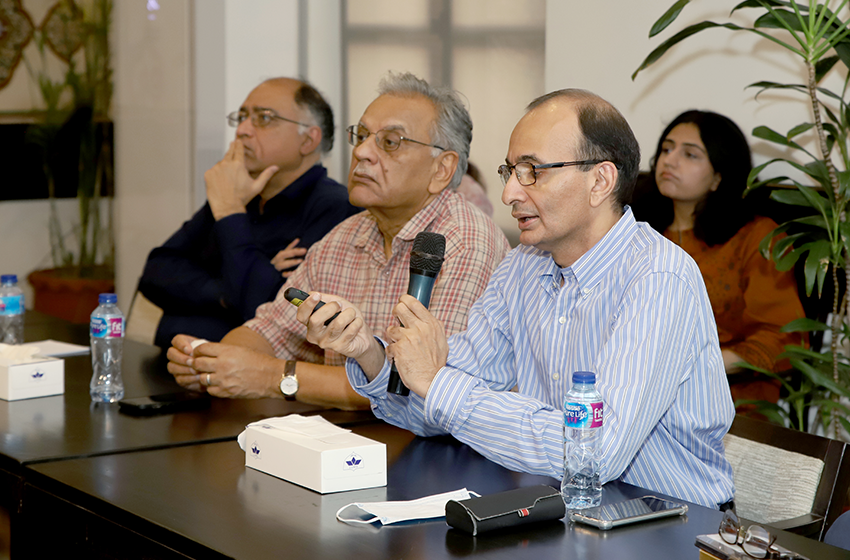
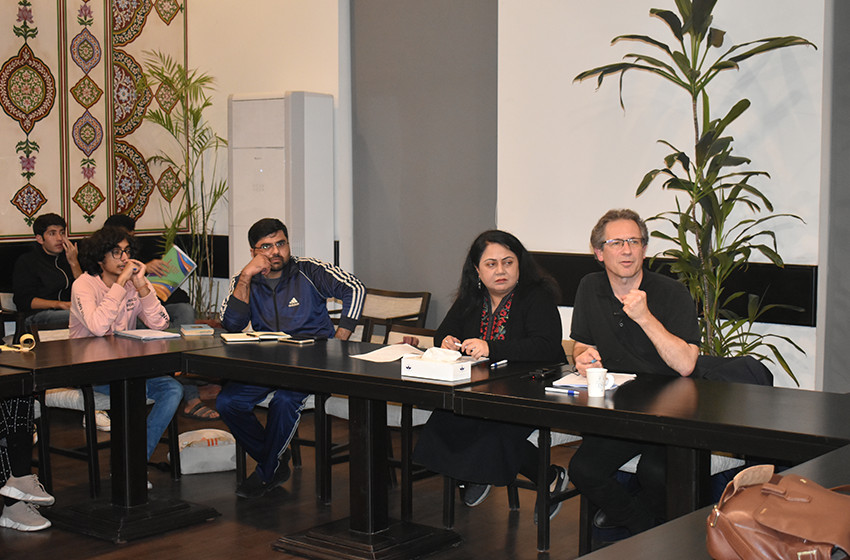
MHRC Distinguished Lecture
MHRC hosted Dr. Christophe Jaffrelot for a talk titled ‘Is Narendra Modi Moving to a Hatrick? A Reflection on the 2024 Lok Sabha Elections in India’. The talk, moderated by Dr. Asma Faiz, Associate Professor, LUMS, delved into the dynamics of national populism, electoral strategies, and ethnic democracy, examining their impact on the 2024 Lok Sabha elections in India.
Annual Conference 2023: Pathways to Development
MHRC hosted a three-day conference titled ‘Pathways to Development: Inequalities and Social Justice’ in collaboration with Institute of Development & Economic Alternatives (IDEAS), Chaudhry Nazar Muhammad Department of Economics at LUMS, Institute of Development Studies at University of Sussex (IDS), Consortium for Development Policy Research (CDPR), International Growth Centre, International Growth Centre (IGC), and Centre for Economic Research in Pakistan (CERP).
The conference saw prominent academics, researchers, social scientists, practitioners, policymakers, and great minds from the Pakistani diaspora gather at LUMS to discuss issues vital to inequalities and social justice in Pakistan. The conference showcased the work of our thriving research community. The speakers spanned both local and international policy and educational institutions including the World Bank, Yale University, Oxford University, London School of Economics and Political Science, Princeton University, Cornell University, Human Rights Commission of Pakistan, CRC University of Punjab, Tabadlab, Agha Khan University, and National University of Singapore, among others.
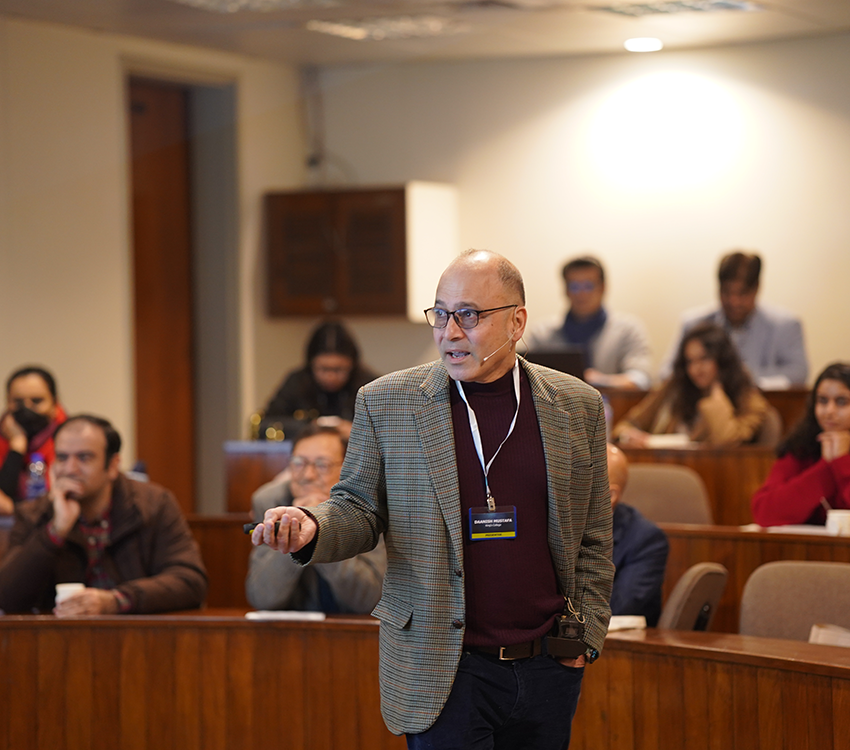
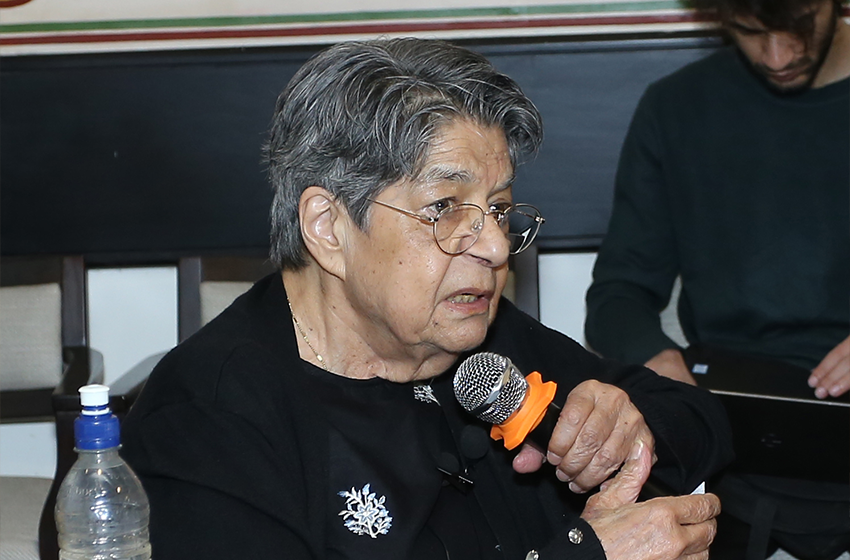
Nigar Ahmed – Rubina Saigol Lecture Series
Under this series, MHRC (in collaboration with SWGI) proudly hosted Nighat Said Khan, a founding member of the Women Action Forum. Khan delved into the intricate history of the Women's Action Forum (WAF) and the evolving dialectic between WAF and the Aurat March.
MHRC Webinar Series
As part of the Political Economy of Development series at MHRC, a talk titled ‘Who Knows How to Govern? Procedural Knowledge in India's Small-Town Councils’, by Dr. Adam Auerbach (Johns Hopkins) focused on a concerning lack of procedural knowledge among local officials, impacting their ability to govern effectively.
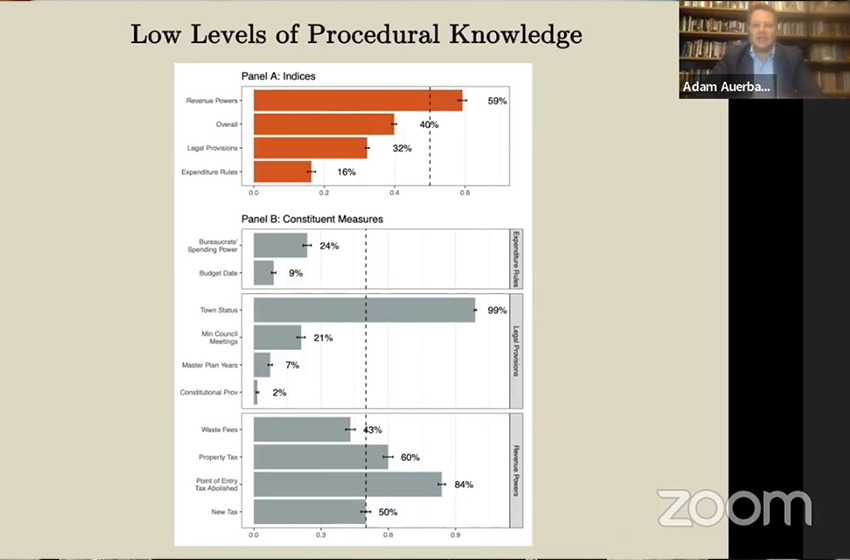
Panel Discussions: Political Economy of Development
Navigating the Grid in the ‘World-Class City’: Findings from Lahore and Colombo
MHRC hosted an insightful session titled “Navigating the Grid in the ‘World-Class City’: Findings from Lahore and Colombo”. The panel included Iromi Perera (Colombo Urban Lab), Dr. Asha Abeyasekera (University of York), Vraie Balthazar (Law and Society Trust), Dr. Dileepa Witharana (Open University of Srilanka), Hala Malik (Hyper-Practice/IDEAS), Fizzah Sajjad (IDEAS/London School of Economics), and Dr. Umair Javed (LUMS/IDEAS). The discussion was facilitated via a film called ‘Being Here’ which brought into perspective the inequalities that exist in the urbanisation of villages in both Lahore and Colombo, especially from the perspective of women.
Climate Resilient Infrastructure in Pakistan
MHRC in collaboration with Sustainable Energy and Economic Development (SEED) hosted a pivotal panel on Climate Resilient Infrastructure in Pakistan. This panel included Dr. Omar Mukhtar (SEED), Dr. Syed M. Hasan (LUMS), Taimur Khan (SEED), Dr. Syed M. Ali (UET, PSW/SEED), and Dr. Momin Uppal (LUMS); it was moderated by Nimra Ejaz (SEED). The panelists emphasised the need for a paradigm shift, and advocated for planning based on climate predictive projections, fostering sustainable and resilient development. The interdisciplinary discussion showcased scientific, engineering, and economic approaches to bolster climate resilience. It highlighted the importance of partnerships to address climate challenges, recognising Pakistan's vulnerability despite its low carbon footprint.
Mapping Lahore's Water (Ine)quality
MHRC hosted a discussion lead by Dr. Ameem Lutfi and Dr. Nousheen Zaidi titled ‘Mapping Lahore's Water (Ine)quality’. The talk highlighted the variances in bacterial loads, their correlation with socio-economic divides, and the possible collective actions for remedying the situation. Employing a systematic study of over 1,200 households from Lahore’s private housing societies to working-class informal communities, it offered a microcosmic view of specific contamination hotspots, enriched by bacterial profiling, ethnographic inquiry, and household surveys.
I.A. Rehman Lecture Series on Social Justice and Change
Under this banner, MHRC hosted Nimer Sultany (SOAS). This insightful talk, moderated by Osama Siddique, unpacked the paradoxical movement of recent human rights discourse considering Palestine’s plight. By positioning the question of Palestine as a ‘litmus test’ for international law and human rights, Sultany highlighted the systematic and institutionalised nature of Israeli oppression and domination facilitated via blind spots in the application of international human rights law.
Local Government Forum (LGF)
In collaboration with Dehleez and IDEAS, MHRC hosted a ‘Local Governments Forum’. The Forum facilitated dialogues across provinces among civil society, political representatives, policymakers, academics, and the judiciary on reforms to boost local government capacity, unlock fiscal potential, and ensure inclusive governance.
Research Projects
Selected ongoing projects based at MHRC, led by our fellows, include:
-
The Economic History of the Punjab Canal Colonies
- Principal Investigators: Dr. Ali Cheema -
Levelling the Tax Playing Field - Evidence from Punjab, Pakistan
- Principal Investigator: Dr. Sher Afghan Asad -
Pilot study to Evaluate Strategies to Increase the Uptake of QR payments by Micro and Small Merchants in Pakistan
- Principal Investigators: Dr. Kashif Malik and Dr. Farah Said
The Centre’s Partners
- UN Development Programme
- Institute of Development Studies
- Centre for Economic Research Pakistan
- Akhuwat Foundation
- International Growth Centre
- Small and Medium Enterprises Development Authority Punjab
- Consortium for Development Policy Research

